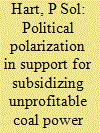| Srl | Item |
| 1 |
ID:
104886


|
|
|
|
|
| Publication |
2011.
|
| Summary/Abstract |
Across the United States, universities are grappling with challenges associated with adopting approaches to more sustainable energy use. One approach has been to develop energy-related projects in their local, host communities. Because host communities can play a major role in the successful planning and implementation of these projects, understanding the factors relating to their support is important. Building on research that suggests that procedural fairness is one such key factor, this study examines community members' support of six approaches a local university could implement to work towards a goal of carbon neutrality. The results of a mail survey (N=677) found that perceived fairness of campus decision makers was significantly related to community support for the proposed approaches; however, beliefs about the efficacy of the different approaches to address challenges associated with climate change had the strongest relationship with support. The results also suggest that residents prefer changes in the energy infrastructure, such as the development of wind power, over the purchase of carbon offsets. We discuss the results in terms of actions that universities may take to foster community engagement in decision-making for university-sponsored sustainable energy projects.
|
|
|
|
|
|
|
|
|
|
|
|
|
|
|
|
| 2 |
ID:
150038


|
|
|
|
|
| Summary/Abstract |
A growing area of research has addressed public perception of unconventional oil and natural gas development via hydraulic fracturing (“fracking”). We extend this research by examining how geographic proximity to such extraction interacts with political ideology to influence issue support. Regression analysis of data from a fall 2013 national telephone survey of United States residents reveals that as respondents’ geographic distance from areas experiencing significant development increases, political ideology becomes more strongly associated with issue support, with the liberal-partisan divide widening. Our findings support construal level theory's central premise: that people use more abstract considerations (like political ideology) the more geographically removed they are from an issue. We discuss implications for studying public opinion of energy development as well as for risk communication.
|
|
|
|
|
|
|
|
|
|
|
|
|
|
|
|
| 3 |
ID:
177414


|
|
|
|
|
| Summary/Abstract |
Coal power plant-based energy production has declined dramatically since 2011, leading to calls from some politicians for government subsidies to support unprofitable coal power plants. This study is the first to use a nationally representative sample to assess American public support for subsidizing coal power plants. We find moderate public opposition overall along with a partisan divide, with liberal opposition and conservative support. In addition, messages that frame coal subsidies as contributing to air pollution vs. climate change do not have a differential effect on policy support, nor is there moderation by political ideology on the message frame. Finally, the level of political polarization around subsidizing coal power plants is similar in magnitude to public polarization around whether climate change should be a national priority - one of the most polarizing issues today. Overall, results suggest that policy proposals to subsidize coal power production, regardless of how they are framed, are likely to be acceptable to conservatives but draw liberal opposition.
|
|
|
|
|
|
|
|
|
|
|
|
|
|
|
|